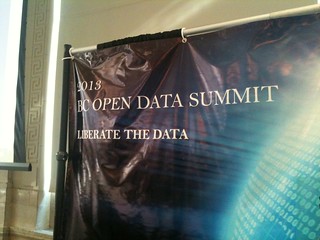 I guess I shouldn’t be disappointed; I’m not sure why I was expecting anything different, but it was a conference. There were a few speakers that stood out for me, but quite a number that didn’t. I had hoped to find a field more closely connected to its local environment and communities; instead I found one that seems to suffer many of the same problems as “open education” – being way too supply-side driven, with many of the people sharing the data not even sure they want to. This is captured in the tagline of the summit – “Liberate the Data.” Like so many efforts before it, that inadvertently turns what should have been means (open data) into an end in and of itself. Add to this the familiar question of “engagement,” as if this was a problem to solve after you’ve built whatever it is “they” are to come to.
I guess I shouldn’t be disappointed; I’m not sure why I was expecting anything different, but it was a conference. There were a few speakers that stood out for me, but quite a number that didn’t. I had hoped to find a field more closely connected to its local environment and communities; instead I found one that seems to suffer many of the same problems as “open education” – being way too supply-side driven, with many of the people sharing the data not even sure they want to. This is captured in the tagline of the summit – “Liberate the Data.” Like so many efforts before it, that inadvertently turns what should have been means (open data) into an end in and of itself. Add to this the familiar question of “engagement,” as if this was a problem to solve after you’ve built whatever it is “they” are to come to.
I’m probably being harsh; it is still early days, there are lots of good people involved, and lots of good intentions (though you know what they ay about those…) Still, it feels like so much giving people fish and not fishing lessons. Just like an open ed conference bereft of learners, an open data conference with no citizens seems…lacking.
But enough harping on what didn’t work. There were some pieces that did for me. I really liked the use of the term “civic infrastructure” by the impressive Philip Ashlock – I don’t think it has to be an either/or between providing data and providing platforms, but approaches that look at how governments can provide trusted platforms for citizens to accomplish what *they want to do* seem to bake the whole “adoption” issue right into the solution from the start.
I very much appreciated Luke Closs‘ lightning talk (which I’d have voted to be a 30 minute slot) on open data business models. Citing the
“Business Model Canvas” as inspiration, Lucas described 4 possible models for people trying to startup open data projects:
- Citizen Funded: in which users pay for an app or subscriptions, or it is ad supported.
- City Funded: in which you are developing something to then sell to municipalities
- Infrastructure Service: in which you are marketing to developers, make it easy for hackers to use in their town
- Public Open Source Service: in which you try to crowdfund the ongoing operations (e.g. ISP costs) of a service that otherwise uses open source software and volunteers
I appreciated this as I really need to think harder about how some of my citizen-oriented projects can thrive, ad the “Business Model Canvas” seems to provide a useful, lightweight way to think through the problem.

I also need to acknowledge the organizers of the BC Open Data Summit for providing the BEST CONFERENCE LUNCH EVAR, bento boxes! Genius idea – I will have to ask the organizers about the cost (which I expect wasn’t cheap) but it’s a great idea for a portable, elegant lunch solution.
Finally, Peter Forde‘s talk titled “People are Dying to get the Data” really struck a chord, both for invoking the names of Bradley Manning and Aaron Swartz, but also for the mixture of serious advice and playful suggestions on how to make open data more real for people. His urging to solve “real” problems, and to shun teh shiny of digital dashboards and analytics for the power of narrative really struck a chord for me, as they are both things I need reminding of. Plus my geeky side liked it for the mention of a couple of nifty gadgets – Pebble, a bluetooth watch that allows you to display notifications and data from your phone while it’s in your pocket, and NinjaBlocks a simple plug and play platform to build digital apps that control real world appliances and devices. Sure, a bit of a stretch at an open data conference, but fun!
Ultimately, my disappoints with the event were really disappointments in my own performance; I really didn’t make any new connections and the productive hallway conversation I did have was with one of the few people I already knew at the event. Still, it brought to mind lessons learned numerous times at Northern Voice and Open Ed, that “open” isn’t the same as “inviting,” and that if organizers really do want to grow a movement, real care has to be paid to how we bring newcomers into the fold.
